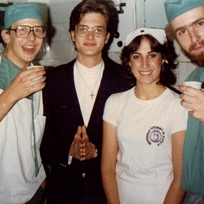Todd's current position (2018): Director of Strategic Communications, Adelphi University.
Reason you chose this program: As a high school student, I'd been in Mexico and in Spain for brief visits, but really wanted to experience a different culture in an intense way. I'd connected with language and culture at least on a superficial basis, but the opportunity to do it for a full academic year was incredibly appealing.
Best memory: Too many to choose a best one. A few stand out, though, nearly 30 years later - experiencing an attempted coup d'etat ("golpe de estado" in Spanish) through the eyes of a very scared host family and people on the streets of Madrid, seeing King Juan Carlos save democracy, and then marching with a million-plus happy people to celebrate the defeat of the attempted return to a Franco-like state. Or it could have been all those great tapas and affordable wine....
How did your study abroad program affect your college experience? I developed more tolerance for extreme political and social views - on both sides of the political perspective -- than I would have staying another year on campus. I really started to understand the nuance of the political spectrum, and also of religious belief. I also learned how to stay up late, have fun, get up early, study hard, smoke cheap tobacco (and run a marathon, believe it or not - Spain is culture of paradox after all!), and appreciate good food and wine. [I also keep in touch with those I met abroad] and had a 10- and a 20-year reunion. These were some of the most important relationships I developed in my four years as an undergrad.
What have been the longterm benefits of study abroad? It's really become a part of who I am. I took my wife to Spain for an extended visit a decade later, and we've always had a very international life. Traveling in the last few years with my now-16-year-old daughter to Italy, Iran, and Costa Rica, I think I've shared the sense of appreciating other cultures, learning while enjoying international travel, and mastering another language well enough to get along.
Explain the impact study abroad has in the workplace: The most basic skill I acquired is a better ability to jump into about any situation and not get flustered and figure it out. Once you've survived doing economics or geography in Spanish with a Spanish prof, not to mention negotiating hot-water time with a tight-fisted señora, you gain a degree of self confidence. (Let's just say that in 1980 Spain, it was considered somewhat excessive to take 15-minute showers every other day....)
If you could do anything differently, you would... Probably spent more time than I should have with my American classmates, though I don't regret that. But not having the lifelines of email, cell phone, txt messages, etc. (limit it to once a week with family and a few friends - they'll understand!) forces you to engage in the culture, place, and people you're living among.
What advice would you have for a student considering study abroad?Do it! Stretch yourself. If you can squeak by in another language, go that direction - you'll learn a lot by doing so, including a lot about yourself. With my group, some of the people who had the very least Spanish language background going into the year have done the most with the language.



